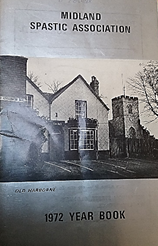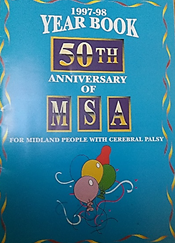Yearbooks
Posted on 27th July 2020 at 15:34
Lets take a look in our Yearbooks!
Cerebral Palsy Midlands (CPM) archives hold a selection of Yearbooks. This type of publication was a common feature of many parent-led associations established in the middle of the twentieth century.
What do Yearbooks reveal?
Their main aims were to highlight association activities and raise awareness of the effects of cerebral palsy on individuals. With the passing of time they have become a valuable historical resource, giving an insight into the development of the association as we can see ‘how things used to be’.
Articles contributed do not confine themselves solely to the year in which they were published and this widens our perspective. Through a close study of Yearbooks, we can reflect on social change and attitudes to cerebral palsy.
The publication dates of the Yearbooks I have examined broadly cover the period from 1972 to 1998.








